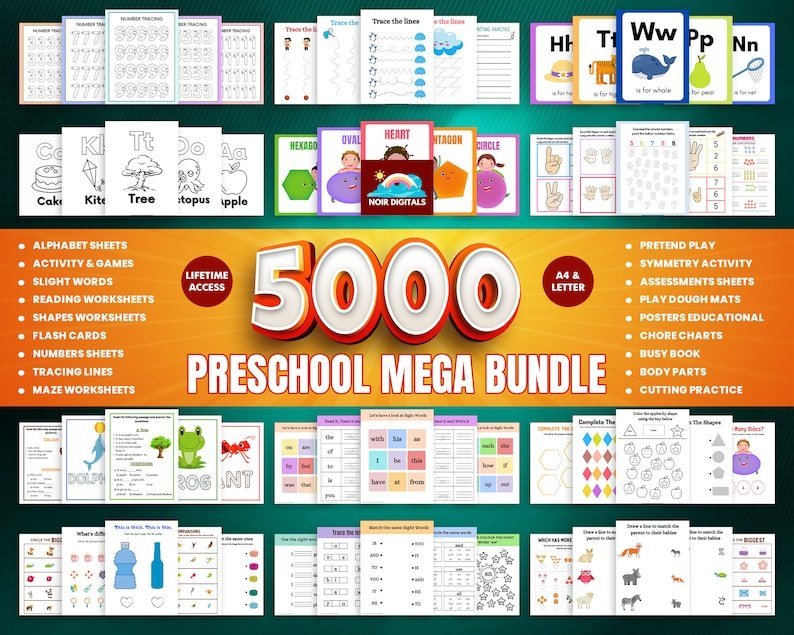Free kids worksheets are one of the most effective resources for young learners to engage in structured, educational activities. These worksheets cover a wide range of subjects like math, reading, writing, and creative thinking, providing interactive and enjoyable learning experiences. Whether at home or in the classroom, worksheets offer the perfect blend of fun and education, helping children build foundational skills that are essential for their development.
This detailed guide explores the benefits of free worksheets, various types available, and how they can be integrated into everyday learning.
Benefits of Using Free Kids Worksheets
Worksheets are more than just simple activities—they are powerful educational tools that promote both cognitive and motor skill development. Below are some of the key benefits:
1. Encourages Active Learning
Free worksheets are designed to be interactive, encouraging children to actively participate. Whether it’s tracing letters, solving puzzles, or coloring shapes, these activities promote hands-on learning and keep children engaged for longer periods of time.
2. Reinforces Concepts
Worksheets help reinforce what children are learning in school or at home. By repeating tasks like writing numbers or practicing reading, kids solidify their understanding of these concepts. This repetition is crucial for long-term memory retention.
3. Improves Fine Motor Skills
Many worksheets require skills like tracing, drawing, cutting, or coloring, which help develop fine motor skills. These activities help children improve hand-eye coordination, pencil grip, and the control needed for writing.
4. Customizable Learning
Worksheets are available on a wide range of topics and difficulty levels, which allows for a customized learning experience. Parents and teachers can select activities that match a child’s specific abilities and interests, ensuring that learning is both effective and enjoyable.
5. Supports Independent Learning
Worksheets often require minimal supervision, encouraging children to complete activities on their own. This promotes independence, problem-solving skills, and the confidence to tackle challenges by themselves.
6. Easily Accessible
One of the greatest advantages of free worksheets is that they are easily accessible online. There are countless resources that offer printable worksheets, meaning parents and teachers can quickly find materials that suit their needs without additional cost.
Types of Free Worksheets for Kids
Free worksheets cater to a variety of subjects and skills, allowing children to practice and expand their knowledge in different areas. Below are some of the most common types of worksheets, categorized by subject.
1. Math Worksheets
Math is an essential subject, and worksheets provide a fun and structured way for children to practice key skills. These worksheets range from basic counting to more advanced concepts like addition, subtraction, and geometry.
Examples of Math Worksheets:
- Number Tracing: Helps children learn to write numbers by tracing dotted outlines.
- Simple Addition and Subtraction: Introduces basic math operations through visual aids, like pictures or number lines.
- Shape Recognition: Focuses on identifying different shapes, such as circles, squares, and triangles, often incorporating coloring activities.
- Math Puzzles: Fun challenges, like counting objects or solving simple word problems, to make learning math enjoyable.
2. Reading and Writing Worksheets
Language development is a core part of early learning. Reading and writing worksheets introduce foundational literacy skills, helping children recognize letters, improve vocabulary, and begin constructing sentences.
Examples of Reading and Writing Worksheets:
- Alphabet Tracing: Guides children in tracing both uppercase and lowercase letters.
- Phonics Worksheets: Focuses on letter sounds and blends, helping children understand the basics of word formation.
- Simple Sentences: Encourages children to read or write short sentences, often accompanied by pictures to enhance comprehension.
- Sight Word Practice: Builds reading fluency by helping children recognize common words without needing to sound them out.
3. Creativity and Coloring Worksheets
Creativity is essential for a child’s cognitive and emotional development. Coloring worksheets not only stimulate imagination but also help children practice control and concentration. Drawing activities also encourage creativity and artistic expression.
Examples of Creativity Worksheets:
- Color by Number: Combines number recognition and creativity, where children color in areas of a picture based on a numbered guide.
- Drawing Prompts: Encourages children to complete or add to a partially drawn picture.
- Design Your Own: Worksheets that allow children to create their own patterns, animals, or scenes using guided lines and shapes.
4. Critical Thinking Worksheets
As children grow, developing critical thinking and problem-solving skills becomes important. These worksheets challenge children to think logically, analyze situations, and find solutions.
Examples of Critical Thinking Worksheets:
- Puzzles and Mazes: Fun activities like mazes or connect-the-dots puzzles that help with focus and attention to detail.
- Sorting and Categorizing: Encourages children to classify objects, shapes, or numbers based on patterns or characteristics.
- Matching Games: Helps children improve memory and recognition by matching pairs of pictures, words, or numbers.
5. Science and Nature Worksheets
Science worksheets introduce children to the world around them, sparking curiosity about nature, animals, and the environment. These worksheets often incorporate hands-on activities or coloring elements to make learning fun.
Examples of Science Worksheets:
- Animal Identification: Encourages children to match animals with their habitats or names.
- The Five Senses: Helps children understand how their senses work through simple activities and illustrations.
- Nature Observation: Worksheets that ask children to draw or identify parts of plants, seasons, or weather conditions.
6. Holiday-Themed Worksheets
Seasonal or holiday-themed worksheets are a fun way to integrate learning with the excitement of upcoming events. These worksheets often combine various subjects—like math, reading, and creativity—into themed activities for holidays such as Halloween, Christmas, or Earth Day.
Examples of Holiday Worksheets:
- Christmas Word Search: A fun activity that helps children find holiday-themed words hidden in a grid.
- Valentine’s Day Math: Simple math problems that use hearts or other Valentine-themed objects to make learning festive.
- Earth Day Coloring Pages: Encourages environmental awareness through creative, themed coloring pages.
How to Use Free Worksheets Effectively
While worksheets are beneficial tools, it’s important to use them effectively to maximize a child’s learning potential. Here are some tips for integrating free worksheets into daily learning routines:
1. Tailor Worksheets to the Child’s Interests
Children are more likely to engage with activities that match their interests. Whether your child loves animals, superheroes, or nature, choose worksheets that reflect their preferences to make learning enjoyable.
2. Incorporate Worksheets into Daily Routines
Using worksheets doesn’t have to be limited to formal learning hours. Incorporate them into everyday activities, such as practicing math during snack time or completing a coloring worksheet while waiting for dinner.
3. Use Worksheets to Track Progress
By regularly completing worksheets, parents and teachers can easily track a child’s progress in different areas. Worksheets can highlight strengths and identify areas where additional practice might be needed.
4. Combine Worksheets with Other Activities
While worksheets are valuable, it’s also important to combine them with other types of learning experiences, such as hands-on projects, outdoor exploration, or interactive games. This ensures a well-rounded educational experience.
5. Make Learning Fun
Worksheets should never feel like a chore. Use colorful markers, stickers, or small rewards to motivate children and make the process of completing worksheets more enjoyable.
Where to Find Free Kids Worksheets
There are numerous online platforms that offer free, printable worksheets in a variety of subjects. Here are some popular sources:
- Education.com: Offers a wide range of free worksheets for different subjects, including math, reading, and science.
- Super Teacher Worksheets: Provides a large selection of printable worksheets for multiple grade levels and subjects.
- K5 Learning: Focuses on early learning with worksheets covering math, reading, and writing.
- 123 Homeschool 4 Me: A website that offers free worksheets, activities, and lesson ideas, especially for homeschooling parents.



